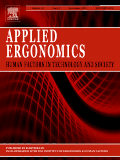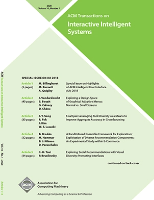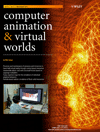
International Journal of Affective Engineering
Scope & Guideline
Transforming engineering with human-centered emotion.
Introduction
Aims and Scopes
- Affective Engineering:
The journal emphasizes research that investigates how emotions can be measured, predicted, and utilized in the design of products, services, and systems to improve user satisfaction and engagement. - Human-Computer Interaction (HCI):
A core area of focus is on improving interactions between humans and machines, exploring how affective computing can enhance user interfaces and user experiences. - Kansei Engineering:
The application of Kansei engineering principles is prevalent, which involves understanding users' emotional responses to products and utilizing this understanding in product design. - Multimodal Sensory Integration:
Research frequently explores how different sensory stimuli (visual, auditory, tactile) interact and affect emotional and cognitive responses, contributing to the design of more immersive experiences. - Psychophysiological Studies:
The journal includes studies that assess physiological responses (e.g., heart rate, EEG) to various stimuli, linking these responses to emotional and cognitive states. - Cultural and Contextual Factors:
There is a consistent focus on how cultural differences influence emotional responses and perceptions, particularly in product design and user experience.
Trending and Emerging
- Interactive and Adaptive Systems:
There is an increasing focus on developing systems that adapt to users' emotional states in real-time, enhancing user engagement and satisfaction through personalized experiences. - Cross-modal Correspondences:
Research exploring how different sensory modalities interact and influence emotional perceptions is gaining traction, highlighting the importance of multimodal design in creating holistic user experiences. - Neurofeedback and Biofeedback Technologies:
Emerging studies are investigating the applications of neurofeedback and biofeedback in affective engineering, aiming to enhance user interaction through physiological monitoring. - Digital and Virtual Environments:
The journal is seeing a surge in studies focused on affective responses within virtual reality (VR) and augmented reality (AR), reflecting the growing relevance of immersive technologies. - AI and Emotion Recognition:
Research on the integration of artificial intelligence in recognizing and responding to human emotions is trending, with implications for user interface design and interactive systems.
Declining or Waning
- Traditional Kansei Applications:
Research specifically focused on traditional Kansei applications in static product design has decreased as the field evolves towards more dynamic and interactive applications. - Physical Product Evaluation:
There is a noticeable reduction in studies that solely evaluate physical products without considering the emotional or affective dimensions, as the focus shifts towards integrated user experiences. - Static User Experience Studies:
The exploration of static user experience evaluations has waned, with a growing preference for studies that incorporate real-time, interactive, and context-aware assessments. - Limited Focus on Non-Digital Contexts:
Research addressing affective engineering in non-digital contexts has diminished, with a trend towards digital and virtual environments, particularly post-pandemic.
Similar Journals

IEEE Open Journal of the Computer Society
Bridging Ideas and Innovation in TechnologyIEEE Open Journal of the Computer Society is an esteemed open-access journal dedicated to advancing the field of computer science. Published by IEEE-INST ELECTRICAL ELECTRONICS ENGINEERS INC since 2020, this journal promotes innovative research and scholarly communication in a rapidly evolving technological landscape. With a notable Q1 ranking in the Computer Science (miscellaneous) category and a high Scopus percentile of 92, it serves as a premier platform for disseminating cutting-edge findings and interdisciplinary studies. The journal is committed to facilitating unrestricted access to valuable insights, fostering collaboration among researchers, professionals, and students alike. As it continues to publish impactful articles through 2024 and beyond, the IEEE Open Journal of the Computer Society remains a vital resource for anyone interested in the latest trends and developments in computer science.

ACM Transactions on Applied Perception
Innovating Understanding of Human Perception with TechnologyACM Transactions on Applied Perception is a leading journal published by the Association for Computing Machinery, focusing on the intersection of perception science and computational methods. With an ISSN of 1544-3558 and an E-ISSN of 1544-3965, this esteemed publication has been a vital resource for innovators and researchers since its establishment in 2004. It operates within the ambit of Computer Science and the realms of Experimental and Cognitive Psychology, boasting a commendable impact factor and category rankings, including Q2 in Computer Science (miscellaneous) and Q3 in both Experimental and Cognitive Psychology and Theoretical Computer Science. The journal's scope encompasses a plethora of studies aimed at understanding human perception through computational lenses, making it an essential platform for scholarly exchange. Although it does not currently offer an Open Access option, its extensive reach and rigorous peer-review process ensure high visibility and impact in the academic community. By fostering collaboration across disciplines, ACM Transactions on Applied Perception encourages advancements that bridge perceptual research with practical applications, making it invaluable for researchers, professionals, and students engaged in this dynamic field.

INTERNATIONAL JOURNAL OF HUMAN-COMPUTER INTERACTION
Innovating the Interface of Human and MachineINTERNATIONAL JOURNAL OF HUMAN-COMPUTER INTERACTION, published by Taylor & Francis Inc, stands at the forefront of research within the interdisciplinary fields of human-computer interaction, human factors, and ergonomics. Since its establishment, the journal has consistently contributed to advancing the understanding of the interactions between people and computers, making it a vital resource for researchers, professionals, and students alike. With an impressive impact factor reflecting its high citation rate, this journal is recognized as a Q1 publication in both Computer Science Applications and Human Factors and Ergonomics categories for 2023, showcasing its stature within the academic community. Additionally, it boasts a commendable ranking within the top percentiles in key areas on Scopus, ensuring that the research published here reaches broad scholarly audiences. Available in traditional subscription format, the journal covers seminal studies from 1989 to 2024, reflecting ongoing innovation in technology and its applications in everyday life, and thus serves as an essential platform for pioneering research that shapes the future of user experience.

International Journal of Mobile Human Computer Interaction
Exploring the nexus of human experience and mobile technology.International Journal of Mobile Human Computer Interaction (IJMHCI) is a leading scholarly publication dedicated to advancing the field of human-computer interaction in mobile environments. Established by IGI Global, this journal has served as a vital platform for researchers and professionals since its inception in 2009. With a focus on innovative designs, user experience, and the evolving landscape of mobile technology, IJMHCI plays a critical role in bridging theoretical research and practical applications. Though currently categorized in Q4 within the Human-Computer Interaction category for 2023, its consistent publication across the years reflects a commitment to fostering insightful discussions among academia and industry practitioners alike. The journal is indexed in Scopus, ranking #78 out of 145 in its field, highlighting its growing influence. While it does not currently offer open access options, its valuable contributions to mobile HCI research make it an essential resource for students and established researchers striving to explore the complexities of human interaction with mobile technologies.

Multimodal Technologies and Interaction
Exploring the Future of User Experience.Multimodal Technologies and Interaction, published by MDPI since 2017, is an esteemed open-access journal based in Switzerland, dedicated to the exploration and advancement of innovative multimodal systems that enhance user experience across various digital platforms. With its commitment to disseminating high-quality research in diverse areas such as Computer Networks and Communications, Human-Computer Interaction, and Neuroscience, the journal has rapidly established itself within the academic community, achieving a commendable position in Scopus rankings including Q2 in both Computer Networks and Communications and Computer Science Applications. As an essential resource for researchers, professionals, and students alike, Multimodal Technologies and Interaction fosters interdisciplinary dialogue and supports the development of cutting-edge technologies, ensuring that advancements in multimodal interaction are accessible to a global audience. Scholars can benefit from its Open Access format, allowing unrestricted access to influential studies that shape the future of technology and interaction design.

VIRTUAL REALITY
Unlocking New Realities Through Cutting-Edge ResearchVIRTUAL REALITY is a prestigious journal published by SPRINGER LONDON LTD that has been at the forefront of the field since its inception in 1995. This journal, with an ISSN of 1359-4338 and E-ISSN 1434-9957, serves as an indispensable resource for researchers, professionals, and students interested in the rapidly evolving domains of computer graphics, human-computer interaction, and software development. VIRTUAL REALITY holds an impressive Q1 ranking across relevant categories, reflecting its high impact within the academic community, with specific rankings such as 11th overall in Computer Graphics and Computer-Aided Design and 31st in Human-Computer Interaction. This journal aims to publish cutting-edge research that explores theoretical advancements and practical applications related to virtual environments, contributing significantly to knowledge and innovation. With access options available through institutional subscriptions, it continues to shape the landscape of its field and inspire future research in immersive technologies.

APPLIED ERGONOMICS
Exploring Human Factors to Enhance Safety and PerformanceWelcome to Applied Ergonomics, a premier journal dedicated to advancing knowledge and practice in the multidisciplinary field of ergonomics and human factors. Published by Elsevier Science Ltd, this esteemed journal features a diverse range of research covering critical aspects of physical therapy, human factors, safety, and engineering. With an impressive impact factor and consistently ranked in the Q1 category across multiple domains—including Engineering, Human Factors and Ergonomics, and Safety—Applied Ergonomics serves as a vital resource for researchers, professionals, and students aiming to enhance user experience and optimize workplace safety. With its extensive historical archive dating back to 1969 and continuing through 2025, this journal encourages the dissemination of innovative applications and research findings that contribute to the ergonomics body of knowledge. For those interested in cutting-edge research that directly impacts health and safety practices, Applied Ergonomics is the authoritative source.

Design Journal
Fostering Innovation in Design DiscoursesDesign Journal, published by Routledge Journals, Taylor & Francis Ltd, serves as a pivotal platform for interdisciplinary research within the expansive fields of Arts and Humanities as well as Computer Graphics and Computer-Aided Design. With an ISSN of 1460-6925 and an E-ISSN of 1756-3062, this journal is dedicated to disseminating innovative ideas and methodologies that shape contemporary design practices. Ranked in the Q2 category in Arts and Humanities and Q3 in Computer Graphics per the 2023 category quartiles, it stands as a reference point for scholars and practitioners alike, fostering a vibrant community for sharing knowledge and fostering creativity. Researchers will find the journal's scope particularly valuable as it covers a diverse range of topics, providing insights critical for advancing knowledge and practice. With the journal continuing to evolve—converging research avenues from 2005 to 2024—it thrives as a beacon of scholarly excellence in the United Kingdom and beyond, appealing to professionals, researchers, and students eager to engage with cutting-edge design discourse.

ACM Transactions on Interactive Intelligent Systems
Transforming Ideas into Intelligent Interactions.ACM Transactions on Interactive Intelligent Systems is a distinguished journal published by the Association for Computing Machinery (ACM), specializing in the realms of Artificial Intelligence and Human-Computer Interaction. With an impactful presence in the academic community, it boasts a respectable Q2 quartile ranking in both fields as of 2023, highlighting its significant contributions to advancing interactive intelligent systems. The journal, identified by ISSN 2160-6455 and E-ISSN 2160-6463, encompasses a broad spectrum of research from theoretical advancements to practical implementations, offering invaluable insights for researchers, professionals, and students. The journal not only serves as a platform for innovative ideas and methodologies but also emphasizes the importance of interdisciplinary approaches in its publications. Positioned in the United States, at 1601 Broadway, 10th Floor, NEW YORK, NY 10019-7434, it stands out for its commitment to quality, rigor, and relevance within the computing and interactive systems sectors.

COMPUTER ANIMATION AND VIRTUAL WORLDS
Advancing Knowledge at the Intersection of Art and Science.COMPUTER ANIMATION AND VIRTUAL WORLDS, published by Wiley, is a pivotal journal in the fields of Computer Graphics and Computer-Aided Design, as well as Software. With a focus on the intersection of technology and creativity, the journal provides a platform for researchers and professionals to share innovative studies, new methodologies, and insights that shape the future of computer animation and virtual environments. Currently holding a Q2 category in Computer Graphics and a Q3 in Software for 2023, it ranks #63 out of 106 in its niche, highlighting its influence and relevance in the academic community. Though the journal operates under a subscription model, it also offers options for open access, ensuring that a broader audience can engage with groundbreaking research. The journal has been publishing continuously since its inception in 2004 and looks forward to further contributions as it moves towards its 20th anniversary in 2024. Whether you are a seasoned researcher, an industry professional, or a student eager to explore these dynamic fields, COMPUTER ANIMATION AND VIRTUAL WORLDS is an essential resource for advancing knowledge and innovation.